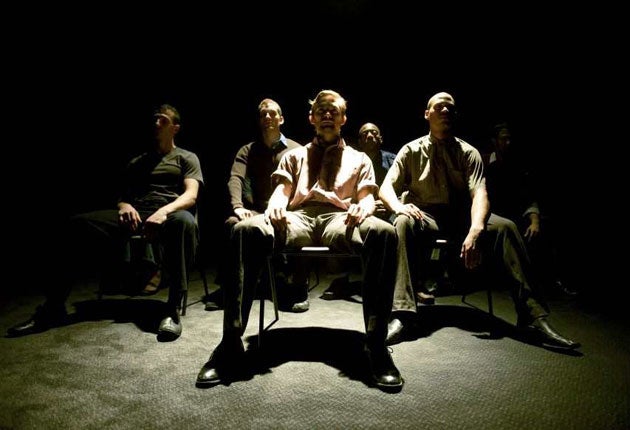The Weekend's Television: Timewatch – The last day of World War One, Sat, BBC2<br></br> Consuming passions: 100 years of Mills & Boon, Sun, BBC4 <br></br> The American future: A history, By Simon Schama, Fri BBC2
Stop all the clocks

"Ninety years on, I'm going on a journey to tell the story of the last day of World War One," Michael Palin promised at the beginning of Timewatch – the Last Day of World War One. "Oh, please don't, Michael,"
I thought. "Make a film" about it by all means. "Tell the story", "investigate" or "examine". But please don't "go on a journey", that flabbiest of all the flabby prefatory clichés. And, while I'm on my hobby horse, couldn't a few more television producers fight the battle against the tedious, cookie-cutter predictability of table-of-contents openings in favour of something a little more trusting of the audience's intelligence? Michael Palin could certainly have delivered it, and there was no shortage of raw material in the film that followed. But instead we got the "forthcoming-highlights" montage that blights so many films, suggesting that they've all been cut according to some Microsoft documentary template.
All right. Dip head in bucket of cold water, shake vigorously, and move on, perhaps to the exceptionally lovely serendipity that led to Palin filming one sequence in a Belgian cemetery on a day of frost and sun-infused fog. It didn't look like this world at all. It looked like something from a Powell and Pressburger sound stage, and it gave an extra poignancy to what he was showing you: a double line of British headstones, one rank of which marked the graves of men who'd fallen in the first month of the war and the second of which commemorated men who'd died in its final hours. The brutal immobility of the conflict, which had ebbed and flowed across this one spot, and its relentless crop of young lives, were neatly bracketed in this one small square of a foreign field.
Whether there should be a greater poignancy to a death that occurs just hours from ceasefire was a point properly acknowledged by Palin at the end of this film. That it was only at the end, though, tacitly acknowledged that we have some difficulty in suppressing the feeling that proximity to safety makes a death more terrible than it might otherwise be. There is no question that it alters the culpability of military commanders, many of whom paid with other mens' lives for ground that in just a few hours they could have strolled towards freely. In one particularly egregious case, a US general called Wright ordered his men to assault the town of Stenay so that they could take a bath, a nicety that resulted in 300 utterly pointless casualties, not counting those on the other side.
Palin did go on a journey, incidentally, travelling to stand in overgrown trenches and walk a field still dense with ammunition and shrapnel. He also visited a military hospital in England, where he examined the records of some of those who didn't die on 11 November and for whom the war didn't really end that day either, since they carried wounds that would mark them for life. You saw a man with half his face blown away, a living anatomy diagram that was a painfully ugly counterpoint to the crisp, white decorum of the war graves, but an honourable one, too. I was in a much better mood when this film ended than I was a minute after it had begun.
Consuming Passions: 100 Years of Mills & Boon was a strange affair, a drama that layered together the story of the founding of the publishing house with two related narratives: about a glum, romance-starved secretary who found herself stirred into fantasy by her mother's hip surgeon, and an English lecturer whose course on popular romance was invaded by an incredibly bumptious student who had a penchant for cheesy seduction. I use the word "incredibly" advisedly. Emma Frost's script occasionally had fun with the gap between readers' real lives and the romantic fantasies they used to escape from them. But that put something of a premium on being able to tell the "real" world from the invented one, and it wasn't always as easy as it should have been. I may have missed the point, of course. Perhaps it was a sly way of demonstrating the dated misogyny of the books, their implication that even the most intelligent women are mere putty in the face of an arrogant demeanour and a tawny six pack. Clearly, the three implausibly happy endings the drama contrived were a knowing commentary on genre satisfaction, but sadly not quite knowing enough to excuse the implausibilities that had preceded them.
The American Future: a History, by Simon Schama, an excellent series in which Schama has traced the roots of some of America's deepest instincts, could also be viewed as the longest and most thoughtful party political broadcast the BBC has ever transmitted. This week's episode, about America's evolving attitudes to its immigrants, began and ended at the Democratic National Convention, with Obama as the apotheosis of America's highest ideals. "Without starry eyes, I do believe in the American future," Schama said, as the fireworks ascended. Just a little starry, I think.
Join our commenting forum
Join thought-provoking conversations, follow other Independent readers and see their replies
Comments